Europe
- By RFE/RL
EU Slaps Tariffs On $23 Billion Of US Goods In Response To Trump's Trade Barrage
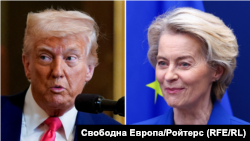
The European Union approved tariffs targeting around 21 billion euros ($23.2 billion) of US goods in retaliation for the 25 percent tariffs President Donald Trump imposed on the bloc's steel and aluminum exports.
A majority of the EU's 27 member states on April 9 voted in favor of the surcharges, some of which will take effect on April 15.
The products facing tariffs include diamonds, agricultural products, poultry, and motorcycles, as well as soybeans, which are a popular export of Louisiana, the US state that is home to Trump loyalist and House Speaker Mike Johnson.
The European Commission, the bloc's executive arm, said in a statement that the countermeasures can be suspended at any time "should the US agree to a fair and balanced negotiated outcome."
The move adds to the growing transatlantic trade war, with the United States also applying a universal 20 percent tariff on nearly all European exports as well as a separate 25 percent tariff on cars and some auto parts.
Trump has said he'll announce additional tariffs on lumber, semiconductor chips and pharmaceutical products. In total, Trump's new tariffs target around 380 billion euros' worth of EU goods.
The second round of EU tariffs will take effect on May 15, while a third wave is slated for December 1. Most of the targeted goods face a 25 percent tariff level, with a few categories set to face 10 percent.
EU leaders have voiced differing views in recent days about whether to exclude some items such as bourbon and wine. France and Italy, keen to avoid US countermeasures on their wine exports, appear to have won this battle.
Trump had threatened a 200 percent tariff on EU alcoholic drinks if US bourbon was hit.
Also excluded from Brussels' plans are items the EU relies on such as aircraft and parts, semiconductors, and fuel.
A decision not to put tariffs on pharmaceuticals matches the US approach. However, Trump has said separate tariffs will be imposed on the sector.
More News
Can the EU Extend Russia Sanctions Despite Hungary's Blackmail?
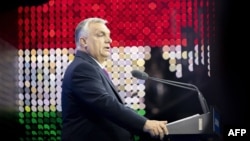
Extending sanctions against Russia has been one of the most pressing issues for the European Union -- especially this year. And Hungary's record of holding out against such sanctions has officials in Brussels worried about what will happen when the next extension deadline comes around, this time in July.
Hungarian Prime Minister Viktor Orban has for a long time voiced opposition to the EU's sanctions on the Kremlin and refused to agree on any new measures that target energy imports into the bloc from Russia.
These rollovers happen every six months and are split into two groups: sectoral sanctions -- such as import bans on various Russian goods -- and listings, meaning visa bans and asset freezes on more than 2,500 Russian individuals and firms.
The sectoral sanctions come up for renewal in January and July, while the listings are reviewed for prolongation in March and September. That adds up to four decisions each calendar year, all of which must be taken unanimously by the 27 EU member states.
In both the January sectoral renewal and the March listings rollover, Hungary -- long critical of EU sanctions on the Kremlin -- toyed with the idea of withholding approval. In the end, Budapest gave the green light, but not without securing some concessions from Brussels.
EU officials in Brussels told me that there is already concern about the upcoming extension of sectoral sanctions in July -- and what Budapest might demand.
The issue is further compounded by a broader question about the West's sanctions policy toward Moscow and the ongoing cease-fire talks between Russia, Ukraine, and the United States.
Sanctions relief, in some form, has been dangled as a potential carrot in front of the Kremlin -- at least from Washington's side -- even though the Europeans, who are not involved in the talks, have dismissed the idea for now.
The question is if that will still hold in the summer.
"Three months is a lifetime in politics, and by that time [US President Donald] Trump might be tired of Russia and ramping up sanctions instead," said one EU official I spoke to, though the official also admitted more EU capitals could be tempted to scale down.
The ever-present threat of a transatlantic trade war hitting EU economies might, according to diplomats, reignite calls to ease sanctions on things like Russian gas, aluminum, steel, and broader trade with Moscow.
What Is Europe's Plan B For Sanctions?
In order to circumvent a potential Hungarian veto this summer or prevent other member states from cherry-picking elements they want removed, the brightest legal minds in Brussels are now poring over legal texts to come up with a Plan B, in case Plan A -- a "clean" prolongation -- proves impossible in July.
And they might have found one.
The idea was already floated during the height of the listings rollover process in March. It remains untested, and it's questionable whether it’s fully legal.
It's also complicated, at least for those outside the "Brussels bubble."
But it looks like this: EU sanctions consist of two legal documents, a decision and a regulation. These texts are essentially identical and function together; member states agree and adopt a decision, which is then implemented as a regulation.
The regulation must be extended every six months by unanimity, while the decision does not. In fact, the decision remains in force unless a qualified majority votes to repeal it.
That would mean sanctions could stay in place without needing a formal extension, and it would sidestep Hungary's big opportunity to "blackmail" the rest of the club on this.
This is very much a fallback option -- and a temporary one, according to diplomats I've spoken with.
Hungary, and potentially others, would likely take the EU to court over it, as the approach would be unprecedented. As one diplomat put it: "Happening on very shaky legal grounds, as we always have used unanimity to prolong sanctions -- that's just the way this has always worked."
But there are other Plan Bs in the works as well. Perhaps the most obvious involves the European Commission proposing more sanctions in the coming weeks, which would mark the 17th sanctions package since Russia's full-scale invasion of Ukraine more than three years ago.
But the trick is that these new sanctions wouldn't actually be adopted. Instead, they'd be "horse-traded" in exchange for Hungary agreeing to the general sanctions rollover.
In that scenario, Budapest could claim a win in that no new sanctions would be approved, while others would at least secure a prolongation of existing sanctions until the end of the year.
Another potential avenue would be to let the sanctions lapse, but to compensate for this by raising tariffs on Russia across all equivalent economic sectors. This type of decision wouldn't require unanimity, so it could fly, but what would the bloc do, for example, with all the export restrictions it has already imposed on Russia?
One option would be to let EU sanctions expire but replicate the same measures at the national level. However, far from all member states have national sanctions legislation and instead rely on a European framework. As a result, implementation would very soon become patchy and inconsistent across the bloc.
There is also another potential dilemma. Apart from sanctions extensions, most EU member states want the bloc to open accession talks with Ukraine in June at the very latest.
This means that another potential Hungarian veto would need to be overcome around the same time as the sanctions one.
It's possible some frozen EU funds that were withheld from Budapest over rule-of-law concerns may need to be heated up and sent its way to get both issues across the line.
Xi Eyes Inroads In Asia, Europe Amid Trump's Tariffs And US-China Tensions
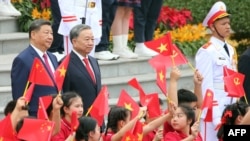
Chinese leader Xi Jinping called for upholding multilateral trade as he landed in Vietnam as part of a high-stakes tour of Southeast Asia's most export-reliant economies as he looks to capitalize on global trade tensions with the United States.
The three-country visit, which begins with a two-day state visit to Vietnam on April 14, will also take Xi to Malaysia and Cambodia as he aims to emphasize China as a stable partner in contrast to the United States, which has imposed and then suspended punishing tariffs across the region and roiled global markets.
"There are no winners in trade wars and tariff wars, and protectionism has no way out," Xi wrote in an article published in Vietnamese state media ahead of his visit, without mentioning the United States specifically.
The Chinese leader also urged strengthening coordination and cooperation through regional initiatives, such as the East Asia Cooperation and the Lancang-Mekong Cooperation, which he called necessary to "inject more stability and positive energy into a chaotic and intertwined world."
Beijing and Hanoi signed 45 agreements, although the contents of all the deals have not yet been disclosed. Xi expected to attend the launch ceremony for a new $8-billion railway project connecting Vietnam and China on April 15. The venture is part of China's Belt and Road Initiative (BRI), a global infrastructure development strategy.
While planned ahead of the announcement of global US tariffs, the tour now forms part of a broader Chinese charm offensive launched in the wake of a growing trade war that saw US President Donald Trump hit China with 145 percent tariffs and Beijing respond with a 125 percent tit-for-tat move on US goods.
Before receiving a 90-day reprieve on "reciprocal" US tariffs, Vietnam and Cambodia were hit with 46 percent and 49 percent tariffs, respectively, and both countries are walking a tightrope in their relations between China and the United States, both of which are important economic partners.
China is also looking for inroads in Europe amid the tariff tumult. Xi hosted Spanish Prime Minister Pedro Sanchez in Beijing on April 11, where he said China and the European Union should "jointly oppose unilateral acts of bullying."
Similarly, Chinese premier Li Qiang spoke with European Commission President Ursula von der Leyen last week when they both emphasized the need for a "strong reformed trading system, free, fair, and founded on a level playing field," according to a readout.
"US tariffs were seen as truly existential, and while we're in a pause on the retaliatory tariffs, there's still this pervading sense of uncertainty around the threat of future tariffs," said Kaitlyn Garman, a senior fellow at the Center for European Policy Analysis (CEPA).
"You can see short- and long-term scenarios where policy decisions will need to be assessed through the lens of the potential that this opens up another point of confrontation with the United States and risks an escalating trade war," she added.
Tariffs Ignite A Delicate Balancing Act in Southeast Asia
Trump has said his goal in unleashing tariffs is to eliminate the US trade deficit once and for all, which he says will help lure more manufacturing back to the United States, creating jobs at home and staunching the flow of US money to China.
But the tariffs also appear to be a negotiating tool for Washington to remake its trade relationships with much of the world.
Some 70 countries are said to currently be negotiating tariff relief with Washington, and US Treasury Secretary Scott Bessent said last week they should "approach China as a group" together with the United States.
Many countries across Asia, however, are also grappling with being slapped by soaring tariffs and debating how to respond in the event that they could be reinstated to their full level after the 90-day pause ends.
It's against this backdrop that Beijing is looking to gain ground with its strategic neighbors in Southeast Asia.
Vietnam and many others in the region have traditionally sought to avoid taking sides between China and the United States. Washington is a crucial export market for southeast Asia and a security partner that serves as a counterbalance to China's assertiveness in the disputed South China Sea.
However, trade in the region is closely intertwined with China, with countries from the regional bloc, the Association of Southeast Asian Nations (ASEAN), counting as the biggest recipient of Chinese exports last year, according to China's customs data.
Vietnam is in the process of looking to negotiate its trade relationship with the Trump administration and has already sent Deputy Prime Minister Ho Duc Phoc to Washington, who promised to buy more US goods, including defense systems, as it looks to avoid the 46 percent levy being reintroduced.
Exports to the United States account for 30 percent of Vietnam's gross domestic product (GDP) and the country has received a boost in recent years as many companies moved there from China to skirt tariffs imposed by Washington.
China Looks For Diplomatic Inroads Elsewhere
Beijing has cast a wide net as it has looked to capitalize diplomatically in the aftermath of US tariffs.
Last week, China held video calls with Malaysia, as well as Saudi Arabia and South Africa. Xi also vowed to deepen China's strategic partnership with Indonesia in a call with that country's president, Prabowo Subianto, on April 13.
Brussels also announced that it plans to host an EU-China summit in July, and the bloc said last week that it agreed to restart talks with Beijing to settle a dispute over Chinese electric vehicle (EV) imports, which the EU hit with tariffs in 2024.
Spanish Prime Minister Sanchez's recent visit to Beijing also made headlines when he called for Europe to review its relationship with China as it adapts to a new reality with the United States. Those comments were met with a rebuke from US Treasury Secretary Bessent, who warned that cooperating with Beijing would be "cutting your own throat."
Analysts say a rapprochement between Brussels and Beijing is not in the cards given that China's support of Russia amid its war in Ukraine has deeply damaged relations with the bloc.
But Trump's tariffs threats, as well disagreements over US diplomacy over how to end the war in Ukraine, are also leading European governments to adjust their foreign policies, which could see them forge closer trading partnerships with other "like-minded" partners in Asia like India, Japan, and South Korea, and elsewhere in Europe with Norway and Britain.
"Europe will invest into robustly promoting trade through a like-minded partners approach," said Reinhard Butikofer, a former Member of the European Parliament. "The European Union will pursue a very active trade policy and try to strike new trade deals."
- By RFE/RL
US Envoy Says Any Deal With Iran Needs Proof Of Nuclear Enrichment Purposes

US Middle East envoy Steve Witkoff said on April 14 that any diplomatic agreement reached with Iran will be centered on details related to verification of the country's uranium enrichment and weapons programs.
"This is going to be much about verification on the enrichment program, and then ultimately verification on weaponization," Witkoff said in an interview on Fox News. "That includes missiles, the type of missiles that they have stockpiled there, and it includes the trigger for a bomb."
Tehran and Washington held the first round of nuclear talks over the weekend in Oman, both saying afterward that the talks were "positive" and "constructive."
The Iranian Foreign Ministry on April 14 said a second round of talks between the United States and Iran will be held in Oman on April 19.
Foreign Ministry spokesman Esmaeil Baghaei was quoted by Iranian state news agency IRNA as saying that it was decided that Muscat will continue to host the talks.
The comment contradicted a statement by Italian Foreign Minister Antonio Tajani, who said the talks would be held in Rome. Tajani said Italy received the request from the interested parties and announced Rome would be the venue.
Tehran also confirmed on April 14 that Foreign Minister Abbas Araqchi will visit Moscow ahead of the next round of talks.
Separately, Iran confirmed on April 13 that Rafael Grossi, director-general of the International Atomic Energy Agency (IAEA), will travel to Iran on April 16.
Araqchi met Witkoff met briefly after the first round of talks ended, adding to optimism relations between the two countries have taken a step forward.
US President Donald Trump has said he wants to ensure Iran will never acquire nuclear weapons. Iran insists its nuclear program is peaceful and wants a deal that leads to the lifting of sanctions that have battered its economy.
Trump has said that in the absence of a deal, there will be military strikes against Iranian nuclear facilities, with potential Israeli involvement.
Estimates suggest Iran could enrich sufficient uranium for a single bomb in less than a week and enough for several bombs within a month.
Meanwhile, the European Union on April 13 introduced sanctions on seven Iranian prison and judicial officials over Tehran's detention of nationals from the bloc.
EU foreign policy chief Kaja Kallas said the sanctions were in response to Iran's "state-sponsored hostage-taking" of European citizens.
On Iran's nuclear program, she said there was a need for a swift resolution because the October deadline to reimpose UN sanctions on Tehran is approaching.
European powers have warned Iran that they will trigger the 2015 nuclear deal's "snapback mechanism" to reimpose UN sanctions if it fails to reach a new deal with the United States.
With reporting by AP and AFP
- By Ray Furlong
Merz Announces New German Government, Cites Concerns About Russia, US Tariffs
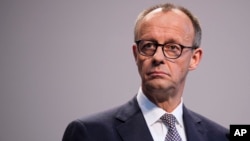
Germany's Christian Democrat leader Friedrich Merz has announced that talks on forming a new coalition government have been completed, stating it would aim to take office in early May.
Merz noted the coalition talks took place amid "growing international political tensions," citing Russian President Vladimir Putin's ongoing invasion of Ukraine and US tariffs.
"The Russian aggressor, Putin, shows no willingness to end the war and to let the guns go silent. At the same time, economic uncertainties are growing enormously. Just this week, US government decisions have caused new turbulence," Merz said.
Merz will be the new German chancellor in a coalition with the Social Democrats, led by Lars Klingbeil, who is expected to be Finance Minister.
Support For Ukraine
As the new government was announced, its 144-page policy plan was published, pledging strong support for Ukraine.
"We will provide comprehensive support to Ukraine so that it can effectively defend itself against the Russian aggressor and assert itself in negotiations," it says.
Germany's outgoing government, which is led by the Social Democrats under Chancellor Olaf Scholz, has been a key supplier of military and economic aid to Ukraine since Russia's full-scale invasion in 2022.
Merz, as opposition leader, has often called on it to be faster and bolder in this. But it's not clear what this will mean in practice.
During a recent visit to Berlin, Ukrainian President Volodymyr Zelenskyy voiced the hope that the new government would supply Taurus cruise missiles -- a longstanding request. Merz, at the time, was noncommittal.
The new government is expected to significantly boost Germany's defense budget, although it's not clear by exactly how much.
Even before taking office, Merz has pushed a constitutional reform through the German parliament that means strict limits on government debt no longer apply to defense spending.
"Our security is currently more endangered than at any time since the end of the Cold War. The greatest and most direct threat comes from Russia," says the new coalition's policy document. It adds that "Putin's pursuit of power threatens the rules-based international order."
Trump Tariffs
There's no mention of the US president in the document.
But when Merz was asked about US ties by a foreign journalist, he switched briefly to English to say, "The message to Donald Trump is: Germany is back on track, Germany will fulfil the obligations in terms of defense."
Asked about US tariffs, Merz said Europe should seek a joint response. His words came hours after EU countries agreed a range of countermeasures, including staggered tariffs on selected imports from the United States beginning on April 15.
Merz is a lifelong transatlantacist who also spent four years working for the US investment company BlackRock. After his election victory in February, amid a tense start in ties between Europe and the new US administration, he said Europe must secure "independence" from Washington in terms of defense.
Still, the coalition agreement says the relationship with Washington is of "paramount importance."
"In trade policy, we seek close cooperation with all of North America. The trans-Atlantic economic area offers the best conditions for success in global competition," it states.
Iran's Nuclear Program
The document also reaffirms Germany's commitment to working with Washington and other Western partners to end Iran's nuclear program.
"We support international sanctions against the Iranian regime and will push for the Revolutionary Guards to be put on the EU list of terror organizations," it says.
The new government's domestic priorities include promises to boost growth via economic reforms and to crackdown on illegal immigration.
The new coalition needs to be approved by Social Democrat party members and the senior leadership of the Christian Democrats, before a confidence vote in parliament.
- By Ray Furlong and
- Merhat Sharipzhan
Trump Hits Back At China With 125 Percent Tariff After Beijing Imposes Hike On US Goods
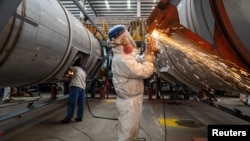
In a swift response to China's decision to impose 84 percent tariffs on a wide range of US imports, President Donald Trump on April 9 announced that the United States will immediately raise tariffs on Chinese goods to 125 percent.
The move marks another escalation in a trade conflict between the world's two largest economies and sets the stage for what could become a prolonged economic standoff.
"Based on the lack of respect that China has shown to the World's Markets, I am hereby raising the Tariff charged to China by the United States of America to 125%, effective immediately," Trump declared on social media. "At some point, hopefully in the near future, China will realize that the days of ripping off the U.S.A., and other Countries, is no longer sustainable or acceptable.”
Treasury Secretary Scott Bessent insisted this had been Trump's strategy all along, telling reporters at the White House that Beijing has “shown themselves to the world as the bad actors.”
In an interview earlier on April 9 with Fox Business, Bessent condemned China's move, saying that it was unfortunate that the Chinese don't want to negotiate "because they are the worst offenders in the international trading system."
China's announcement of sweeping 84 percent tariffs on US imports initially sent shockwaves through global markets.
But the markets soared after Trump reversed his larger “reciprocal” tariffs on most of the world for 90 days in the face of recession fears.
Beijing's announcement of 84 percent tariffs came in response to Washington's 104 percent tariff on imports of Chinese goods. Beijing described the move as a defensive measure in response to what it called "persistent trade aggression" by the United States.
The United States imported $439 billion worth of goods from China last year with smartphones, laptops, lithium-ion batteries, games, and toys among the top items by value. The United States exported $144 billion worth of goods to China, leading to a trade deficit of $295 billion.
China's tariffs on US goods will come into force on April 10. Sectors targeted include American agricultural products, electronics, and industrial machinery -- key pillars of the US export economy.
"If the US insists on further escalating its economic and trade restrictions, China has the firm will and abundant means to take necessary countermeasures and fight to the end," China's Commerce Ministry wrote in a statement.
Wendong Zhang, a professor of applied economics and policy at Cornell University, said China cut its reliance on US goods, including agricultural products, following the previous trade war with the Trump administration in 2018-2019.
"This time around, Chinese leaders have the backing of a more supportive general public to stand up to the US and pivot to domestic consumption," Zhang said in e-mailed comments.
Trump's countermove included an overture to America's trading partners. He announced the 90-day pause on new tariffs for more than 75 countries that, he said, have been working constructively with US officials.
Fears over economic fallout from the tariffs had led to stock market collapses around the world. April 8 was the worst single-day fall since the Covid-19 pandemic in 2020.
Wall Street's benchmark S&P 500 lost more than 10 percent of its values in three days of trading, and Asian markets have also seen steep declines.
These sell-offs continued in the wake of China's announcement on April 9, with London's FTSE 100 index and Frankfurt's Dax both making large losses.
Investors are even selling US Treasury bonds, traditionally seen as a "safe haven" asset.
Paul Ashworth, an economist with the think tank Capital Economics, said that when the bond market began to weaken, it was only a matter of time before Trump folded on his high tariffs. During the 90-day pause all countries except China will have their reciprocal tariff rates set to the minimum 10 percent, he noted.
"Our working assumption now will be that, cowed by the market response, Trump will repeatedly extend the 'pause' meaning that this will end up looking a lot like the 10 percent universal tariff that he campaigned on," Ashworth said in a news release.
Trump has been unmoved by the market turmoil.
He has said his tariff policy is "medicine" and that he won't back down.
On April 8 Trump said partners were "dying" to negotiate new trade deals as a result of his trade measures.
"These countries are calling us up, kissing my ass," he told a Republican Party black-tie dinner.
The latest U.S.-China escalation occurred hours after European Union officials approved tariffs on approximately 21 billion euros ($23.2 billion) worth of U.S. goods in response to the 25 percent tariffs imposed by President Trump on the EU's steel and aluminum exports. On April 9, most of the EU's 27 member states voted in favor of the new tariffs, with some set to take effect on April 15.
EU Ramps Up Military Aid For Moldova

On April 9, European Union ambassadors will green-light the bloc's biggest-ever lethal military aid package to Moldova, worth 20 million euros.
The move is significant as the country is constitutionally neutral and the EU has previously only provided aid that was considered "nonlethal" such as military vehicles, air surveillance, and equipment boosting cybersecurity.
This changed last year, however, when Brussels provided 9 million euros for air-defense systems' short-range interceptors.
Now, the EU is more than doubling that in a reflection of what EU diplomats told me was the vulnerable situation Moldova is under with an increasingly belligerent and active Russia putting pressure on countries wanting to move closer to the West.
According to the proposal, seen by RFE/RL, the money will cover "eight short-range air-defense systems consisting of approximately eight launchers and approximately 24 missiles." The document notes that the implementation of this will be carried out by the Estonian Center for Defense Investments, which supplied Chisinau with equipment last year as well.
The proposal notes that "the proposed assistance measure will improve the performance and operational effectiveness of the Moldovan Armed Forces by replacing outdated Soviet-era equipment and/or establishing new capabilities."
Will Moldova Join The EU?
Moldova ambitiously aims to join the EU this decade, and accession talks are formally set to start in the coming months. The paper notes that the measures are also aimed at bringing Chisinau closer into the fold, adding that the actions are undertaken "with a view to strengthening the Republic of Moldova's capacities to participate in [EU] military common security and defense policy missions and operations, accelerating compliance with Union standards and interoperability."
The approval of these measures comes only a week after the same EU ambassadors gave a thumbs up to another package of financial assistance meant to supplement this one.
The other package, worth 40 million euros, is what the bloc calls nonlethal military aid. Of that sum, half will pay for an estimated 33 high-mobility tactical vehicles to replace old Soviet-type armored vehicles. The other 20 million euros is for what is called a short-range air-defense tactical integration system, essentially allowing the launchers and missiles provided in the "lethal" package to function smoothly.
The 60 million euros combined is the largest yearly amount heading to the small Eastern European republic since Brussels started this type of support in 2021.
The total figure since then will now reach 197 million euros, all coming under the European Peace Facility (EPF), an off-EU budget facility that has also allowed the EU as an entity to provide billions of euros in lethal assistance to Ukraine since the Russian full-scale invasion of the country over three years ago.
Is The US Distancing Itself From Moldova?
Another interesting aspect of the proposal is that there is a hint that the United States, under the new Trump administration, might step away from playing an active role in Moldova's defense sector. The paper notes, "In the past, the United States have been a major contributor in the defense sphere in Moldova, both regarding training and equipment support. Decisions by the new US administration on support to be provided in the future are pending."
It does add, however, that "according to preliminary feedback by the Moldovan Ministry of Defense, the potential downsizing of US training support would not affect equipment provided under [EPF] assistance measures."
What's interesting is that approval of the Moldova EPF was plain-sailing, with discussion among EU working groups on the issue proceeding without major hiccups.
This is in sharp contrast to the EPF requests for Ukraine that Hungary has blocked for nearly two years, as well as a recent new proposal for Armenia with which Budapest also took issue. Hungary delayed the first-ever EPF funding for Yerevan, worth 11 million euros, for several months last year before approving it and is now repeating the stalling tactic.
The new package, seen by RFE/RL, contains 20 million euros earmarked primarily for medical equipment for the Armenian armed forces. Like last year, EU diplomats are telling me Budapest is holding off approval by arguing that Azerbaijan, which enjoys close relations with the Fidesz-led Hungarian government, should be offered something similar.
- By Ray Furlong
Fresh Ukraine Talks To Highlight Divisions Between US And Europe
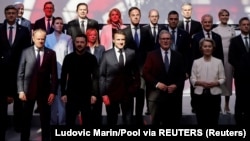
Another week of military planning and diplomacy will again underline the divisions between Washington and its European allies over policy on Ukraine, with two key meetings on successive days at NATO headquarters in Brussels.
The United States will be absent from the first and also looks set to play no major role in the second, as European countries seek to forge ahead with their own plans.
The first gathering on April 10 will bring together Defense Ministers from the so-called coalition of the willing , which also includes non-European countries such as Canada and Australia.
The 30-nation group formed in early March following an explosive bust-up between US President Donald Trump and Ukrainian President Volodymyr Zelenskyy in the White House. Among its chief goals is the creation of a military force to deploy to Ukraine following a cease-fire or peace deal.
A big problem for creating the force is that many nations, including Britain, have said that it would only be possible with a "US backstop," meaning air support, logistics, and intelligence.
So far, there's been no clear signal from the United States that it's ready to help.
Former NATO Supreme Commander in Europe, Philip Breedlove, told RFE/RL he did not believe there was the political will in Washington to do so -- but that Europe should push ahead with its plans anyway.
"If Mr. Putin looks across the fence and sees a large coalition of the willing, and that includes Great Britain, France, and Germany, he will have pause," he said.
It is unclear if Germany would take part in any military presence in Ukraine. The country is in political transition following elections in February, with talks on forming a new coalition government ongoing.
Britain and France have spearheaded the coalition, pledging to provide military muscle for the mission, and will be hosting the April 10 talks.
"I think Europe could do this by themselves," said Breedlove.
"The Russian army is beaten up. It desperately needs the United States to provide a peace time so that they can refit and refurb. It'll be the greatest gift we ever gave Russia to allow them to rebuild."
His remarks echo earlier comments by Ben Hodges , former commander of the US Army in Europe, who told RFE/RL last month that European forces had "women and men with good equipment" who could handle the job without US involvement.
But getting the US involved remains a key item on the agenda.
"The Europeans have to convince Trump to back the idea," Jamie Shea, who served in various senior NATO roles before retiring in 2018, told RFE/RL.
"It clearly is going to be a small force and not on the front lines…. The big issue is, will the force ever be deployed if there is no peace and the war continues?" Shea added.
The day after the coalition of the willing talks, the new transatlantic divide will be on display again at a meeting of the Ukraine Defense Contact Group, set up in 2022 by then-US Defense Secretary Lloyd Austin.
Austin chaired the meetings, aimed at coordinating military aid to Ukraine following Russia's full-scale invasion. But his successor, Pete Hegseth, has apparently decided to skip it. A Pentagon statement on April 4 said that he would be traveling to Panama.
"Leaders of our European allies should take primary responsibility for defense of the continent," said Hegseth in February.
"Values are important. But you can't shoot values. You can't shoot flags, and you can't shoot strong speeches. There is no replacement for hard power," he added, urging higher defense spending in Europe.
Hegseth was speaking the day after attending, but not chairing, the previous meeting of the Contact Group.
"Hegseth's absence would suggest that the US has no new package of support to announce," former NATO official Shea said.
"The United States is probably still tying the assistance to the outcome of negotiations on the minerals deal with Ukraine."
"I count Secretary Hegseth a friend personally. But I would tell you that I think it's a huge mistake that he doesn't go," said Breedlove.
"America needs to continue to show leadership in Europe."
Moldova's Army Gets A Boost From The EU
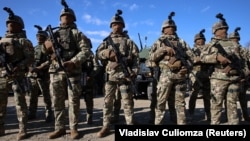
Welcome to Wider Europe, RFE/RL's new newsletter focusing on the key issues concerning the European Union, NATO, and other institutions and their relationships with the Western Balkans and Europe's Eastern neighborhoods.
I'm RFE/RL Europe Editor Rikard Jozwiak, and this week I'm drilling down on two issues: fresh military aid for Moldova and a conversation with the EU's Kaja Kallas.
Briefing #1: EU Ramps Up Military Aid For Moldova
What You Need To Know: On April 9, European Union ambassadors will green-light the bloc's biggest-ever lethal military aid package to Moldova, worth 20 million euros.
The move is significant as the country is constitutionally neutral and the EU has previously only provided aid that was considered "nonlethal" such as military vehicles, air surveillance, and equipment boosting cybersecurity.
This changed last year, however, when Brussels provided 9 million euros for air-defense systems' short-range interceptors.
Now, the EU is more than doubling that in a reflection of what EU diplomats told me was the vulnerable situation Moldova is under with an increasingly belligerent and active Russia putting pressure on countries wanting to move closer to the West.
According to the proposal, seen by RFE/RL, the money will cover "eight short-range air-defense systems consisting of approximately eight launchers and approximately 24 missiles." The document notes that the implementation of this will be carried out by the Estonian Center for Defense Investments, which supplied Chisinau with equipment last year as well.
Deep Background: The proposal notes that "the proposed assistance measure will improve the performance and operational effectiveness of the Moldovan Armed Forces by replacing outdated Soviet-era equipment and/or establishing new capabilities."
Moldova ambitiously aims to join the EU this decade, and accession talks are formally set to start in the coming months. The paper notes that the measures are also aimed at bringing Chisinau closer into the fold, adding that the actions are undertaken "with a view to strengthening the Republic of Moldova's capacities to participate in [EU] military common security and defense policy missions and operations, accelerating compliance with Union standards and interoperability."
The approval of these measures comes only a week after the same EU ambassadors gave a thumbs up to another package of financial assistance meant to supplement this one.
The other package, worth 40 million euros, is what the bloc calls nonlethal military aid. Of that sum, half will pay for an estimated 33 high-mobility tactical vehicles to replace old Soviet-type armored vehicles. The other 20 million euros is for what is called a short-range air-defense tactical integration system, essentially allowing the launchers and missiles provided in the "lethal" package to function smoothly.
Drilling Down
• The 60 million euros combined is the largest yearly amount heading to the small Eastern European republic since Brussels started this type of support in 2021.
• The total figure since then will now reach 197 million euros, all coming under the European Peace Facility (EPF), an off-EU budget facility that has also allowed the EU as an entity to provide billions of euros in lethal assistance to Ukraine since the Russian full-scale invasion of the country over three years ago.
• Another interesting aspect of the proposal is that there is a hint that the United States, under the new Trump administration,, might step away from playing an active role in Moldova's defense sector. The paper notes, "In the past, the United States have been a major contributor in the defense sphere in Moldova, both regarding training and equipment support. Decisions by the new US administration on support to be provided in the future are pending."
• It does add, however, that "according to preliminary feedback by the Moldovan Ministry of Defense, the potential downsizing of US training support would not affect equipment provided under [EPF] assistance measures."
• What's interesting is that approval of the Moldova EPF was plain-sailing, with discussion among EU working groups on the issue proceeding without major hiccups.
• This is in sharp contrast to the EPF requests for Ukraine that Hungary has blocked for nearly two years, as well as a recent new proposal for Armenia with which Budapest also took issue. Hungary delayed the first-ever EPF funding for Yerevan, worth 11 million euros, for several months last year before approving it and is now repeating the stalling tactic.
• The new package, seen by RFE/RL, contains 20 million euros earmarked primarily for medical equipment for the Armenian armed forces. Like last year, EU diplomats are telling me Budapest is holding off approval by arguing that Azerbaijan, which enjoys close relations with the Fidesz-led Hungarian government, should be offered something similar.
Briefing #2: The Kallas Conversation
What You Need To Know: It's fair to say Kaja Kallas has had a tough start as the EU foreign policy chief. Four months into the job and the club's diplomats are already complaining to the media about how the Estonian is handling the bloc's top diplomatic job.
Now, Brussels is famous for bureaucrats privately berating high-ranking colleagues and officials. It's the veritable fuel that at least keeps the EU media circles spinning, and I've heard plenty of it myself in conversation with my sources -- just as I encountered similar things about her predecessors.
Some of the criticisms of Kallas are warranted, while others are not.
Not securing a bilateral agreement with US Secretary of State Marco Rubio when going to the United States in March was a blow and demonstrated that Brussels hadn't done enough diplomatic footwork ahead of the trip.
Saying the EU wants Ukraine to win the war against Russia instead of the agreed-upon EU line of "supporting Ukraine for as long as it takes" was to northern and eastern member states a sign of ambition to reshape the narrative.
To others, however, it stoked fears that Kallas only cares about the bloc's eastern neighborhood and that she's obsessed with Russia -- a charge one often hears in Brussels against any Baltic politician.
In truth, she has spent much more time in the south than in the east, traveling several times to the bloc's southern rim, including Egypt, Israel, Jordan and Palestine. Her biggest diplomatic win so far has arguably been securing the EU's Syria sanctions rollback despite some initial howls from EU capitals.
Deep Background: Another charge has been her failure to get some of her initiatives over the line, but this largely has to do with some EU capitals working against her.
Take the push to get fresh money for Ukraine if the United States suddenly halts funding. Her proposal was largely based on EU member states chipping in based on their economic size, so via gross national income (GNI). Both Paris and Rome shot this down, mainly because it would mean they would have to pay up more than they have so far when it comes to Ukraine military aid.
Then there's Kallas's push to sanction the Georgian political leadership even though both Hungary and Slovakia had indicated in lower diplomatic circles in Brussels that this was unacceptable for them, denying her the needed consensus.
One of the more plausible explanations I got for this is that she is the first prime minister to become EU foreign policy chief, while the others have all been foreign ministers and have had some experience of how the EU foreign affairs council works.
They work differently from EU summits, where heads of government assemble in Brussels and where Kallas has cut her teeth. At the latter, there tend to be deals, negotiations and negotiations to be had -- often dragging on for hours, even days. At ministerials, things tend to be structured, carefully choreographed and most items agreed upon beforehand.
Drilling Down
• What's next for Kallas? In a wide-ranging interview with RFE/RL last week on the sidelines of the European Parliament plenary in Strasbourg, she offered me some hints about a number of issues.
• Her views on the Belgrade-Pristina dialogue, which she has inherited from her predecessors, was perhaps what I found the most interesting. The dialogue, initiated in 2011, is an attempt to normalize relations between Serbia and Kosovo but it last happened at the leader level nearly two years ago.
• "We have to keep the end goal in mind, the normalization of their relationship, so that they could both proceed in their European path. So maybe it's the dialogue, or maybe it is another tool. I'm willing to look into it," she told me, hinting that a new format for the talks may be under way.
• What that format can be is anyone's guess at the moment, but something tells me her focus on the Western Balkans will grow in the coming months with the aim of speeding up the region's EU integration. She is currently on a trip to Albania, Bosnia-Herzegovina, and Montenegro and will be in Serbia in May. Developments here are worth watching.
• What also became clear is her limits on doing something new in Georgia: "What we have done is to help the NGOs and civil society, so the funds that we had for the government, we have redirected them to the civil society to help them to really go on the European path."
• Yet, she admitted that no EU restrictive measures are on the table going forward: "You know, we have to have the agreement by 27 countries. And that is a problem here."
• Dealing with Hungary will be a challenge. In EU foreign policy, things are decided via unanimity, meaning that Budapest be a headache for the foreseeable future. She did, however, manage to get the bloc's Russia sanctions extended recently despite loud Hungarian protests.
• But it is not only on sanctions policy. Take Israeli Prime Minister Benjamin Netanyahu's visit to Hungary last week. He's been indicted by the International Criminal Court (ICC), and Budapest should have tried to arrest him. Instead, he was welcomed with open arms and the country announced its intention to leave the court.
• When I asked Kallas if she fears something similar will happen if the Russian President Vladimir Putin, another ICC-indictee, comes to EU territory, her answer was worryingly deflective: "The problem is that the EU is not the member of the convention, it's the member states. If a person comes to their territory, they also have to implement the ICC decisions."
• Therein lies very much her problem: She is beholden to the whims of all EU member states, with Hungary the most problematic at the moment. Being a former EU prime minister, she understands that. But it will frustrate her at every turn she makes.
Looking Ahead
The NATO HQ in Brussels will host two meetings this week that aren't strictly related to the military alliance.
On April 10, defense ministers of the "coalition of the willing" -- a gathering of largely European nations led by Britain and France -- are assembling to continue work on "a reassurance force" for Ukraine after a potential permanent cease-fire has been agreed.
The day after the Ukraine Defense Contact Group (known as the Ramstein group), chaired this time by Britain and Germany, will come together to look at more military contributions to Ukraine.
That's all for this week!
Feel free to reach out to me on any of these issues on Twitter @RikardJozwiak, or on e-mail at jozwiakr@rferl.org.
Until next time,
Rikard Jozwiak
If you enjoyed this briefing and don't want to miss the next edition subscribe here.
What 'Unprecedented' US Tariffs Mean For Europe
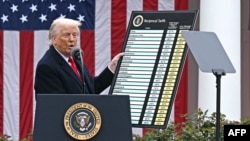
US President Donald Trump's April 2 announcement to raise tariffs to the highest level in more than 100 years has sent stock markets tumbling and shaken the global economy.
"This is unprecedented in the last century in terms of the scale of tariffs, the number of countries hit, [and] just the sheer level of these tariffs," Emily Kilcrease, a senior fellow at the Center for a New American Security (CNAS), told RFE/RL.
"I think we're going to see shocks that you can't fully anticipate because we've never seen this sort of high level of tariffs in the era of globalization," she said.
That worldwide fallout could hit the European Union particularly hard, economists who spoke to RFE/RL said.
The direct impact of Trump's 20 percent levy on EU products has sparked fears of coming inflation and about the economic outlook for the 27-country bloc's embattled manufacturers, who are already reeling from US levies on cars and steel. Experts say other major sectors, such as Europe's pharmaceutical industry, which exports heavily to the US market, could also be hard-hit.
"These pharmaceutical firms will try to sell into the US as much as they can," Reid I'Anson, a senior economist at the trade intelligence firm Kpler, told RFE/RL. "They may drop their prices a little bit to try and stay competitive, but it is very likely that outright demand in the US for European goods will decline. That will flow through to a weaker economic environment in Europe."
How Hard Will Trump's Tariffs Hit Europe?
Tariffs are essentially a tax paid by an importer that are usually passed on to distributors, wholesalers, retailers, and ultimately, to consumers.
About 60 countries that run the largest trade surpluses with the United States -- including key allies such as the EU, Japan, and South Korea -- now face extra tariffs higher than the flat 10 percent levy announcement, with dozens of others facing tariffs that could extend to 50 percent or more in total.
During his announcement in the White House's Rose Garden, Trump said the basic 10 percent tariff on almost all countries takes effect on April 5, while the higher so-called reciprocal tariff rates would apply starting April 9.
While economists say the tariff regime announced by Trump is set to make levied goods in the country more expensive, it will also affect industries in Europe and elsewhere that rely on exporting to the US market.
"European exporters selling things to the United States are going to have to pay a higher cost, which is passed on to American consumers, but it's going to affect their ability to sell things [and] they're going to lose market share," Matthew Goodman, director of the Greenberg Center for Geoeconomic Studies at the Council on Foreign Relations, told RFE/RL.
Brussels and individual European governments are still deciding how to react and further negotiations could take place, but the prospect of retaliatory tariffs placed on US products is real, with European Commission President Ursula von der Leyen saying the bloc is "now preparing for further countermeasures, to protect our interests and our businesses if negotiations fail."
Goodman says any retaliation from Europe will raise costs for European consumers and would also raise inflation and slow growth in the United States.
"That has big implications for everybody in the world because [the United States is] the largest economy in the world, and if our economy slows, then everybody gets hit," he said.
CNAS's Kilcrease, who is a former deputy assistant US trade representative, says Trump's tariffs could also have knock-on effects for Europe, including higher prices and even job losses for key industries.
"I'd actually be quite worried about jobs impacts and about investment impacts because you just don't have that customer anymore, or it's just going to be much harder with a 20 percent tariff to sell into that market," she said.
How Will The Global Impact Of Trump's Tariffs Affect Europe?
The new US tariffs could also have global fallout, affecting the price of key products that rely on global supply chains and reorienting the flow of international trade in unexpected ways.
The price of an iPhone, for instance, could increase by 30 to 40 percent in the United States, according to projections by the financial firm Rosenblatt Securities.
The cheapest iPhone 16 model is currently listed at $799 but could cost as much as $1,142 if Apple decided to pass the cost on to consumers. A more expensive iPhone 16 Pro Max that currently retails at $1,599 could rise to nearly $2,300. Similar percentage increases are projected for other markets.
"This is going to have ripple effects, and it's going to feed through the many different things that go into an iPhone, from the semiconductors made in Taiwan to the glass that is made in Japan, to the assembly of the iPhone in China," said Goodman. "All these things are going to be hit with tariffs, and so the price is ultimately going to be passed on to consumers, both in Europe and in the United States."
Washington's escalating trade war with Beijing will also come with worldwide repercussions that will hit Europe directly and indirectly.
China announced on April 4 that it will impose additional tariffs of 34 percent on imports from the United States in retaliation for duties of the same amount unveiled by Trump. The "reciprocal" tariff placed on China is on top of a 20 percent levy already imposed by the Trump administration.
Trump also targeted countries through which Chinese companies have been diverting products to the US market, among them Vietnam, which faces a new tariff of 46 percent.
As Kpler's I'Anson explains, the United States accounts for around 25 percent of Chinese exports, but with that market now saddled with tariffs, Chinese exporters will have to cut prices and reorient those products to other markets.
This could in turn lead to a flood of discounted Chinese imports around the world, something Brussels has said it is already tracking and preparing countermeasures to protect its manufacturers from.
"It's very possible that there could be this flood of goods coming into Europe in a way that causes real economic problems for Europeans," Kilcrease said. "It may cause another drag on the competitiveness of European firms who are making those same sorts of goods."
- By RFE/RL
Hundreds Mourn At Farewell For Four US Soldiers Who Died In Lithuania

Hundreds of Lithuanians gathered in Vilnius on April 3 to honor four American soldiers who died during a training exercise in Lithuania, as a procession carrying their coffins passed through the city's Cathedral Square.
Lithuanian President Gitanas Nausada, who attended the ceremony, expressed his condolences to the families of the soldiers and said the recovery operations, supported by international cooperation, were "the best proof of NATO's invincibility."
“Their readiness to be with us, as they say, in a difficult neighborhood, is the best proof of who our friends are today," Nauseda told reporters.
Defense Minister Davile Sakaliene and the archbishop of Vilnius were among those present at the ceremony.
Sakaliene emphasized that the joint rescue efforts by soldiers from Lithuania, the United States, Germany, Poland, and Estonia demonstrated "unity" in times of crisis.
"We consider US soldiers in Lithuania as our own. The farewell ceremony once again demonstrated our society's solidarity, respect, and gratitude to the Americans," the Lithuanian Defense Ministry said in a post on Facebook.
The last US soldier missing in Lithuania was found dead on April 1, ending a massive weeklong search for the four service members whose armored vehicle was pulled from a swampy training area, the US military said.
The bodies of the first three soldiers from the US Army's 1st Armored Brigade Combat Team, 3rd Infantry Division, and their M88A2 Hercules armored recovery vehicle had been retrieved on March 31.
The soldiers were on a tactical training exercise when they went missing.
US Major General Curtis Taylor, commanding general of the 1st Armored Division, earlier expressed thanks to everyone who contributed to the recovery operation.
"We cannot thank our allies and fellow service members enough, especially Lithuanians, who spared no resource in support of this mission," he said.
Lithuania, a NATO and EU member, hosts more than 1,000 US troops stationed in the Baltic nation on a rotational basis.
During Visit By Israel's Netanyahu, Hungary Announces It Will Withdraw From ICC
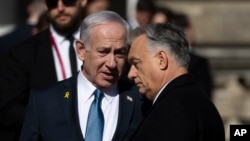
Hungary announced it is withdrawing from the International Criminal Court (ICC) as Israeli Prime Minister Benjamin Netanyahu arrived in Budapest for his first trip to Europe since an ICC arrest warrant was issued for him over alleged war crimes in Gaza.
Hungarian Defense Minister Kristof Szalay-Bobrovniczky met Netanyahu at the Budapest airport at around 2:30 a.m. before acknowledging the Israeli leader's arrival in a post on Facebook.
Hours later, Prime Minister Viktor Orban's chief of staff, Gergely Gulyas, was quoted by the state news agency MTI as saying the government was moving to pull out of The Hague-based court, confirming what diplomatic sources inside Hungary told RFE/RL earlier this week.
Orban followed that by saying during a news conference with Netanyahu that "recent ICC decisions show that it has become a political instrument" as witnessed "most clearly by the decisions on Israel."
"We are exiting the ICC," he added.
Even before the announcement, Netanyahu was virtually certain he would not be detained during his four-day visit.
As a signatory to The Hague court, Hungary has an obligation to arrest him, but its domestic legal situation is complicated and has given the government enough wiggle room to welcome him.
Since the court has no police force of its own, it has no way to enforce its rulings and relies on states to comply.
The process of leaving the ICC is expected to take up to a year as parliament must approve such a move.
"The Hungarian justice minister will hand over to the national parliament the paperwork on our termination of cooperation with the court," Orban said.
Orban publicly extended an invitation to Netanyahu in November shortly after the ICC issued the warrant, and has called the ICC warrant “Brazen, cynical and completely unacceptable.”
"I will guarantee him, if he comes, that the judgment of the ICC will have no effect in Hungary," Orban said.
What Are The Political Reasons?
Orban has closely aligned himself with Netanyahu and with US President Donald Trump, who has also criticized the court's warrant. Neither the US nor Israel are parties to the ICC.
Trump issued sanctions against the ICC last month, criticizing as "baseless" its arrest warrants for Netanyahu and former Israeli Defense Minister Yoav Gallant.
The indictment says Netanyahu is "allegedly responsible for the war crimes of starvation as a method of warfare and of intentionally directing an attack against the civilian population; and the crimes against humanity of murder, persecution, and other inhumane acts from at least 8 October 2023 until at least 20 May 2024."
What's The Legal Position?
Other countries have defied the court's arrest warrants in the past, and even German Chancellor Olaf Scholz said on April 3 he could "not imagine" an arrest warrant being executed against Netanyahu if he were to visit Germany.
"It is not for states to unilaterally determine the soundness of the court's legal decisions," court spokesman Fadi El-Abdallah told RFE/RL, adding it was a "legal obligation to the court" to enforce them.
This view was endorsed by two senior lawyers who spoke to RFE/RL.
"If Mr. Netanyahu visits a state party like Hungary or Germany and is not arrested, this state violates its obligations under the Rome Statute of the ICC," said Kai Ambos, professor of criminal and international law at Germany's Goettingen University.
"The nonexecution of ICC arrest warrants undermines the court's legitimacy," said Ambos, who serves as a war crimes judge at the Kosovo Specialist Chambers, an international court set up for crimes committed during the 1990s Kosovo conflict.
Tamas Adany, an associate professor of international law in Hungary, agreed with this but also pointed to a nuance.
"Globally speaking, there are countries where, whenever they ratify an international treaty, it becomes part of the law of the land," he said.
"Most other countries, where the typical language of multilateral treaties is not an official language…rely on a process called promulgation" to make an international obligation part of national law, he said.
Hungary ratified the Rome Statute in 2001 under the first Orban government. But it has never carried out the second step, which basically amounts to incorporating the statute into the country's own national legal code.
"The question is hard because Hungary is under a legal obligation from the perspective of international law to comply with this. But Hungarian national law does not make it possible for the authorities [to do so]," Adany said.
This reasoning has also been used by the Hungarian authorities.
"Thanks to former President Janos Ader, we had the sense to never make it part of domestic law," government spokesman Gergely Gulyassaid on March 13.
Yet Adany said the law was not entirely clear on this point, because Netanyahu is accused of crimes that have been considered part of customary international law since the 1940s.
"I'm very positive that those parts of the Rome Statute, which are considered by a majority of states to be customary international law in nature, should be enforced in Hungary even without a formal promulgation," he said.
Is Hungary Alone?
Gulyas pointed to another reason for not arresting Netanyahu. When the court warrant was issued, Germany offered an ambiguous response.
"I find it hard to imagine that we would make arrests on this basis," government spokesman Steffen Hebestreit said, adding that legal questions had to be clarified about the warrant.
Then, in January, Christian Democrat leader Friedrich Merz said he would find "ways and means" to invite Netanyahu to Germany. Merz's party subsequently won federal elections, and he is now preparing to take office as the country's next chancellor.
Gulyas, the Hungarian government spokesman, seized on this.
"Since a country of Germany's size and power thinks that it must disregard its own domestic law because the decision of the International Criminal Court is so absurd, what is the point of the whole thing?" he said.
What Would Be The Consequences?
Merz's comments were hugely controversial in Germany.
Ambos said there could be "sanctions" for not carrying out an arrest warrant, imposed by the ICC's Assembly of State Parties, which is responsible for various court matters, including the election of judges and prosecutors and setting its budget.
"Such a situation just arose with regard to Vladimir Putin's visit and nonarrest in Mongolia," he added, referring to the Russian president's visit there in September.
Putin is wanted for the war crime of abducting children from Russian-occupied Ukraine.
"The consequence for Hungary is that we may possibly lose our voting rights in the Assembly of States Parties," Adany said, adding there could be a "judicial investigation into this conduct of Hungary."
The political fallout might be quite limited.
Hungary is already highly isolated within the European Union, where it has been accused of democratic backsliding and curtailing media freedom. Its pro-Russia positions have also led to diplomatic problems.
"I'm absolutely positive that the arrest is not going to happen," Adany said. "Netanyahu is going to travel home safely."
- By RFE/RL
Rubio Reiterates US Commitment To NATO At Foreign Ministers Meeting In Brussels
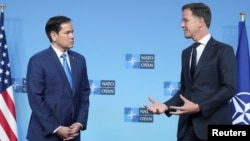
US Secretary of State Marco Rubio said the Trump administration is committed to remaining in NATO and urged the military alliance's 32 members to pledge to increase spending to strengthen its defense capabilities.
Speaking as he arrived in Brussels for a two-day meeting of NATO foreign ministers, Rubio said the United States was "as active as it has ever been" in the alliance as he sought to allay concerns that US President Donald Trump is undercutting transatlantic relations.
"President Trump's made clear he supports NATO. We're going to remain in NATO," Rubio said before entering the meeting.
"We do want to leave here with an understanding that we are on a pathway, a realistic pathway, to every single one of the members committed and fulfilling a promise to reach up to 5 percent of spending. That includes the US."
Ahead of the meeting, NATO Secretary-General Mark Rutte also tried to tamp down fears over Trump's commitment to the alliance, saying in his mind the US's dedication to NATO "is absolutely clear."
"I know there has been some tough language. I know that there have been allies, for example, on this side of the pond being worried about the long-term commitment of the US to NATO," Rutte said on April 2.
"I'm absolutely convinced this alliance is there to stay with the US. Their commitment is absolutely clear," he added.
NATO allies have been determined to present a united front to counter Russia's full-scale invasion of Ukraine, but the European allies feel their efforts have been marginalized.
In search of a quick cease-fire deal, Washington has suggested Ukraine might have to make territorial concessions and taken step to restart a dialogue with Russia.
Rubio is expected to be confronted with questions from allies who are alarmed, angered, and confused by the Trump administration's moves to mend ties with Russia and its rhetorical attacks on longtime transatlantic partners.
Based on what they have seen and heard since Trump took office in January, European officials have expressed deep concerns about the future US role in the alliance.
Rubio likely also will be pressed to explain Trump's stated desire to make NATO ally Canada the 51st state and his push to annex Greenland, which is autonomous within the Kingdom of Denmark, another NATO ally.
NATO leaders in June were expected to decide whether to raise the defense spending target for each individual member from its current minimum of 2 percent of gross domestic product (GDP).
The Trump administration has previously floated the idea of a 5 percent of GDP spending minimum, while Rutte has been pushing for every ally to commit to spending at least 3.7 percent of GDP on defense as quickly as possible.
Some European allies will be reluctant to commit too much on defense too soon given they are struggling with low growth and ballooning budget deficits.
Trump's announcement of stiff tariffs on almost every country around the world -- which EU trade chief Maros Sefcovic on April 3 called "unjustified" -- have exacerbated fears that economic growth could slow even further.
Ukrainian Foreign Minister Andriy Sybiha will also attend the NATO meeting and is expected to provide an update on the situation on the battlefield in the war against Russia.
While Ukraine's membership in NATO is off the table for now, most European allies are keen to at least get assurances that US weapons will continue to go to Ukraine and that NATO's training mission for Ukrainian soldiers continues to operate.
However, the United States is no longer chairing the Ukraine Defense Contact Group, known as the Ramstein group, which coordinates military support for Kyiv. The United Kingdom chaired the last meeting of the group in February, and the next one tentatively scheduled for April 11 could be co-chaired by the UK and France.
EU Aims To Elevate Ties With Central Asia At Landmark Samarkand Summit
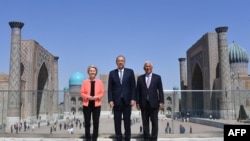
The European Union and Central Asian countries have kicked off their first-ever high-level summit as the bloc eyes new trade and infrastructure investments while aiming to significantly elevate Brussels' ties with the region, according to a draft document for the meeting seen by RFE/RL.
"Reaffirming our commitment to deeper cooperation in an evolving global and regional geopolitical landscape, we have decided to upgrade relations between the European Union and Central Asia to a strategic partnership," states a draft EU version of the joint declaration for the April 3-4 summit's intended outcomes.
Beyond strengthening political ties between Brussels and Central Asia, the draft document, which could still be subject to change, outlines deepening the EU's partnership with the region through enhanced cooperation on water management, critical minerals, and a focus on digital connectivity.
As outlined in the draft document, the 27-country bloc also calls for a greater focus on trade and investment and lumping the array of proposed initiatives for Central Asia under the Global Gateway, the EU's infrastructure partnership plan launched in 2021 that's seen as an alternative to China's worldwide Belt and Road Initiative (BRI).
A key part of the Global Gateway's early footprint in Central Asia is the Trans Caspian Transport Corridor (TCTC), also known as the Middle Corridor, a 6,500-kilometer developing trade route that connects China to Europe through Central Asia and the Caucasus by bypassing Russia. The EU document calls for the route to be expanded further.
The summit is something of a watershed moment for the EU as it aims to boost its regional standing at a time when Russia's full-scale invasion of Ukraine has shifted the geopolitical balance in Central Asia and China's economic expansion has left the region more integrated with Beijing.
But analysts say there are still questions in the region about the EU's interest in Central Asia.
"Central Asia wants a bigger EU presence, but the region's leaders don't have high expectations," Temur Umarov, a fellow at the Carnegie Russia Eurasia Center in Berlin, told RFE/RL.
"So far, the EU hasn't put enough money on the table to make them think that Europe can be this third player that allows Central Asia to rely less on Russia and China," he said.
Why Is The EU Looking To Partner With Central Asia?
Since 2023, Western leaders have been flocking to Central Asia on high-level state visits as they've looked to take advantage of the economic and political window opened by Russia's full-scale invasion of Ukraine in February 2022.
While Central Asian governments have maintained strong ties with Moscow, they've also accelerated their efforts to diversify their relations with other countries. This push to woo new partners and deepen preexisting ties has been boosted by the region containing some of the world's largest hydrocarbon reserves and critical raw materials.
The result has been a flurry of diplomatic inroads made by Brussels and individual European states such as France and Germany in recent years. Turkey, the United Arab Emirates, and other Middle Eastern countries have also expanded their presence.
But the region's deepest inroads have been carved out by China. Beijing has established itself as a leading trade partner and top foreign investor in Central Asia, and China hosted its own landmark summit with Chinese leader Xi Jinping and his regional counterparts in 2024.
Bilateral trade between Central Asia and China, its largest individual trade partner, has been rising steadily in recent years, hitting a record high of $94.8 billion in 2024, but with its 27 member states, the EU is Central Asia's biggest foreign investor.
The EU and the five Central Asia states signed a road map for expanding their ties in 2023. This was later followed by an investors forum in 2024 that saw the EU pledge 10 billion euros ($10.8 billion) toward the Middle Corridor trade route.
Can The Global Gateway Compete With China?
The EU's heightened interest in Central Asia is driven in part by its need to secure new energy supplies and gain access to critical minerals but also to help diversify the region away from its historical reliance on Moscow.
Central to these needs are the development of the Middle Corridor and deepening of the Global Gateway's profile.
"One of the core elements of the EU's approach to Central Asia is to develop connectivity to and through this region," Marie Dumoulin, a program director at the European Council on Foreign Relations, told RFE/RL. "Central Asian countries should benefit from the Global Gateway initiative, but concrete projects are slow to materialize and not very visible."
Since the all-out war in Ukraine, the Middle Corridor has attracted new investment and seen the amount of cargo traveling along its roads, railways, and shipping lanes expand after being avoided for years due to rising costs and border issues.
But the trade route is still grappling with limited capacity and bottlenecks at key ports due to a lack of infrastructure, which still holds it back from being an alternative to the traditional Northern Route that takes goods from China through Russia to Europe.
The EU-Central Asia summit in Samarkand is looking to inject new momentum into those initiatives.
Jacob Mardell, a senior fellow at Sinification and the author of a new report about the future of the Global Gateway, says the EU's infrastructure program gives Brussels an opportunity to create more goodwill in Central Asia and become a more visible player on the ground in a way similar to how the BRI allowed China to expand as an investor and create new opportunities for Chinese businesses.
"Global Gateway might not be a direct response to BRI, but it's a response to the changing environment that the BRI created when it challenged the status quo for development finance," Mardell told RFE/RL. "The EU now has a chance to respond."
- By RFE/RL
Trump Signs Order Imposing 10 Percent Baseline Reciprocal Tariffs, 20 Percent On Imports From EU
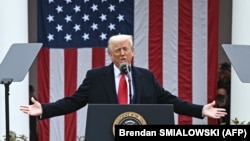
US President Donald Trump on April 2 announced reciprocal tariffs on US trading partners, including 20 percent on goods from the European Union, in a move some experts fear will set off a trade war and cause the world's economy to tank.
Trump called it America's "liberation day," saying it will "forever be remembered as the day American industry was reborn, the day America's destiny was reclaimed, and the day that we began to make America wealthy again."
Speaking in the White House Rose Garden, Trump said he would impose a 10 percent baseline tariff on all imports to the United States and higher duties on imports from dozens of countries around the world.
After railing about how the United States for decades had been "looted, pillaged, raped, and plundered by nations near and far and by friend and foe alike," Trump held up a chart that listed reciprocal tariffs. They included 20 percent on goods from the European Union, 34 percent on Chinese goods, 46 percent on Japanese products, 32 percent on Taiwanese imports, and 25 percent on South Korean imports.
More than a dozen other countries, including Britain, India, Brazil, and Switzerland, also were listed. In each case, he said the US tariffs could have been much steeper, but he opted for "kind reciprocal" tariffs that are half those charged by US trading partners.
Trump said the tariffs imposed by other countries and "colossal trade barriers" had in many cases closed markets around the world to US-manufactured and US-grown agricultural products and had contributed to big trade deficits and a ballooning national debt.
Trump said countries that want access to the US market will now have to "pay for the privilege," adding that he campaigned on the policy throughout last year's presidential race "and today that promise…was kept."
Outside economists have warned that tariffs could slow the global economy, raise the risk of recession, and increase annual living costs for the average US family by thousands of dollars.
British Finance Minister Rachel Reeves was among the first to respond to Trump's announcement, saying, "Trade wars are no good for anyone," while the European Auto Suppliers Association said the 25 percent tariff on vehicles "is misguided and harmful," including for people in the United States.
"Placing tariffs on imports of autos risks damaging the competitiveness and export readiness of an industry that relies on integrated international supply chains and markets for its success," the association said in a statement.
The move marks the rejection of "the rules-based global trade order" and a "turning away from the basis for global value creation and corresponding growth and prosperity in many regions of the world," said Hildegard Mueller, president of the German auto industry association VDA.
But Trump said the tariffs will benefit American farmers, skilled laborers, autoworkers, and the improve the overall economy. He said many major corporations have already pledged to bring manufacturing back to US shores.
"Jobs and factories will come roaring back into our country, and you see it happening already. We will supercharge our domestic industrial base," he said. "We will pry open foreign markets and break down foreign trade barriers and ultimately more production at home will mean stronger competition and lower prices for consumers."
Asian stock markets were lower in early trading on April 3 after Stephen Miran, chairman of the White House Council of Economic Advisers, acknowledged there will be "short-term bumps" caused by the tariffs.
"But what the president is focused on is a long-term transformation and improvement in the durability, sustainability, and fairness of the American economy with respect to the rest of the world," Miran told Fox Business.
Trump has already imposed 20 percent duties on all imports from China and 25 percent duties on steel and aluminum and extended them to nearly $150 billion worth of other key products used in manufacturing.
Trump said the tariffs he announced on April 2 would take effect starting on April 3. The White House said a separate set of tariffs on auto imports that Trump announced last week also will take effect starting on April 3.
Tariff concerns have already slowed manufacturing activity across the globe. Financial markets have been volatile in recent days as investors awaited the announcement. US stocks have erased nearly $5 trillion of value since February.
















































